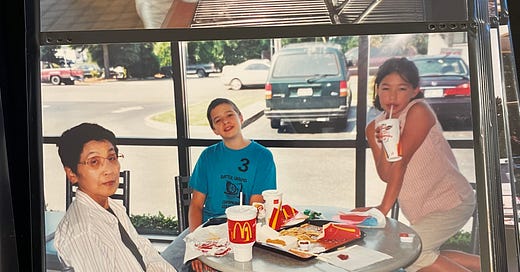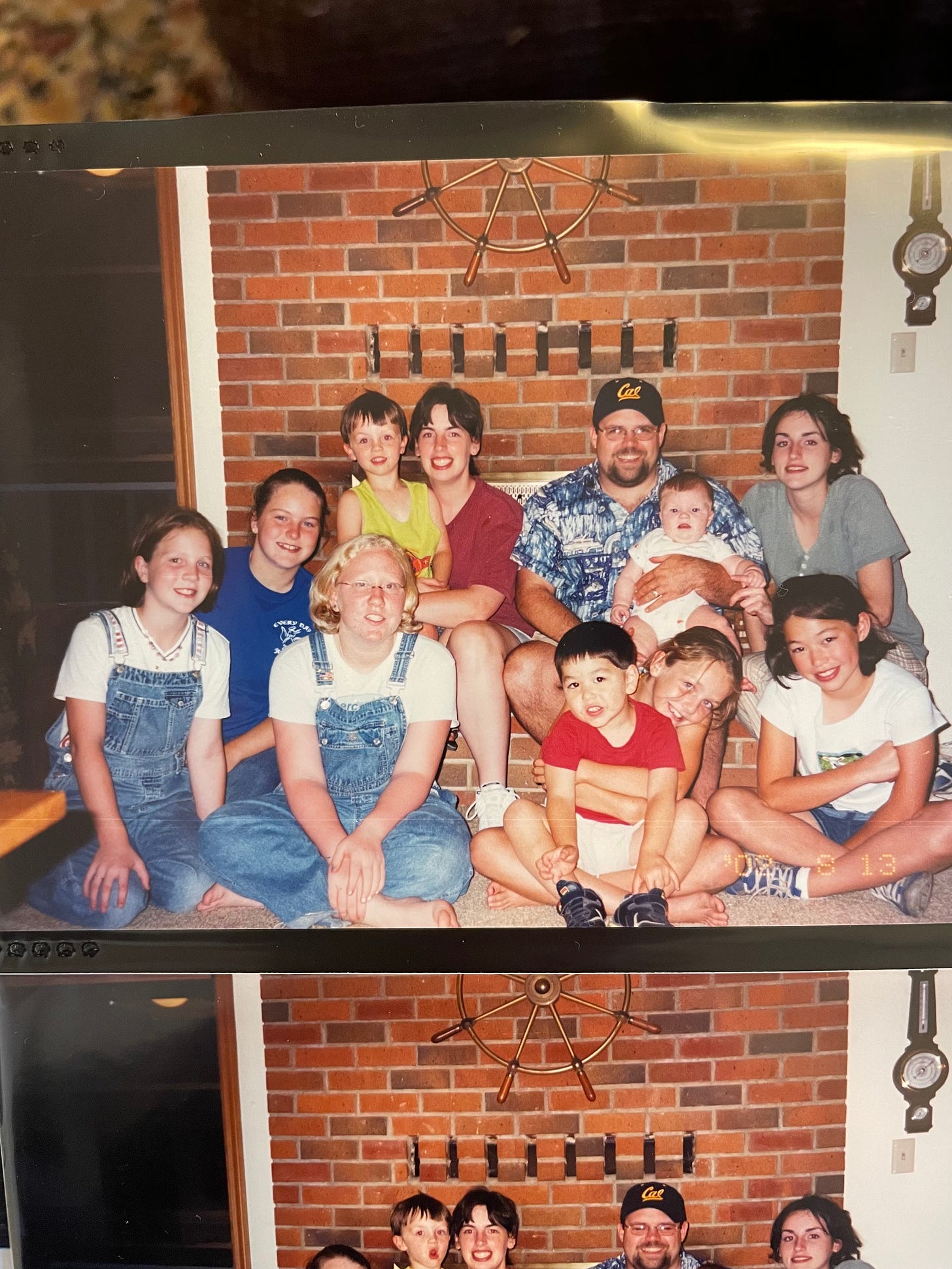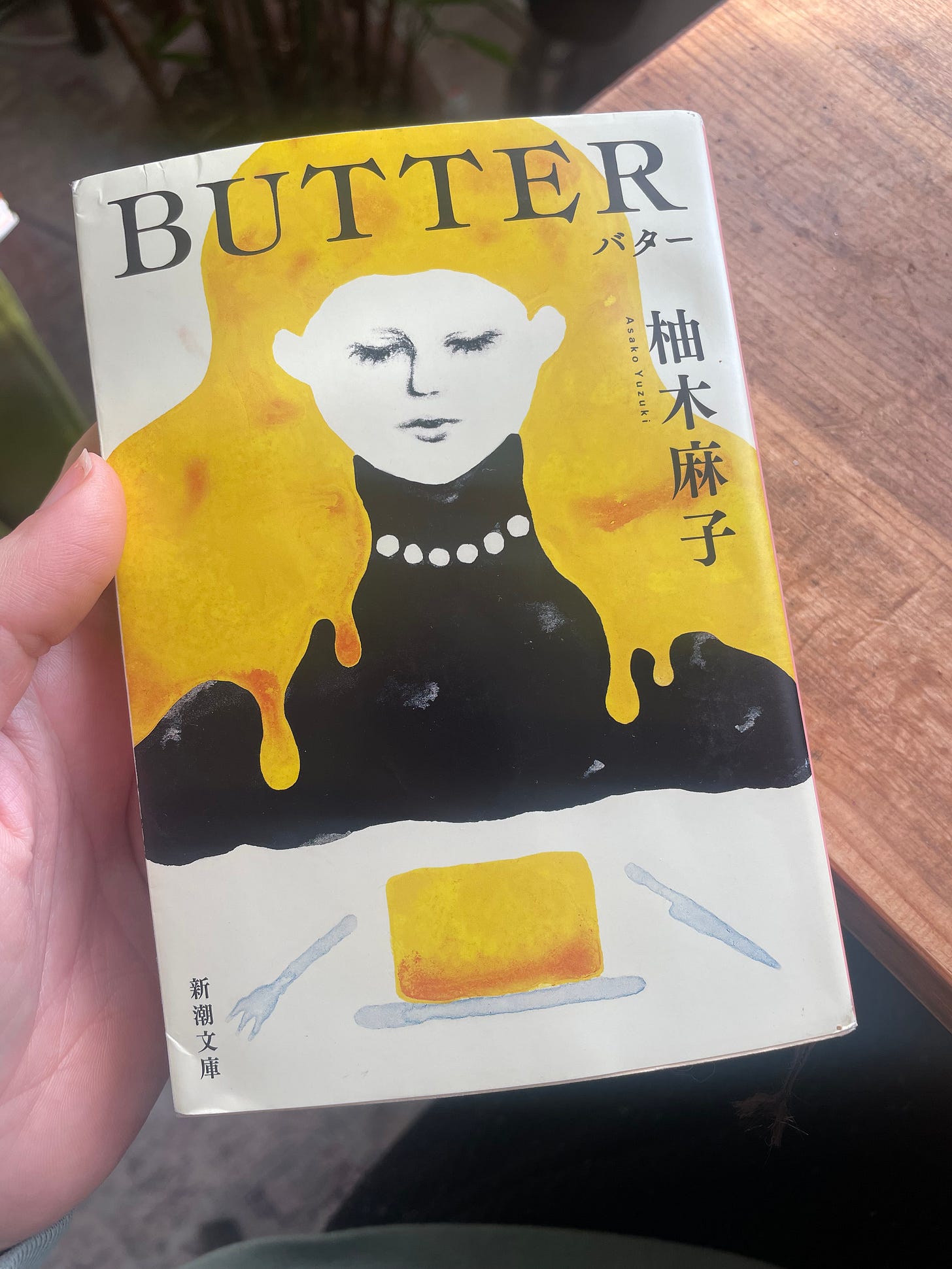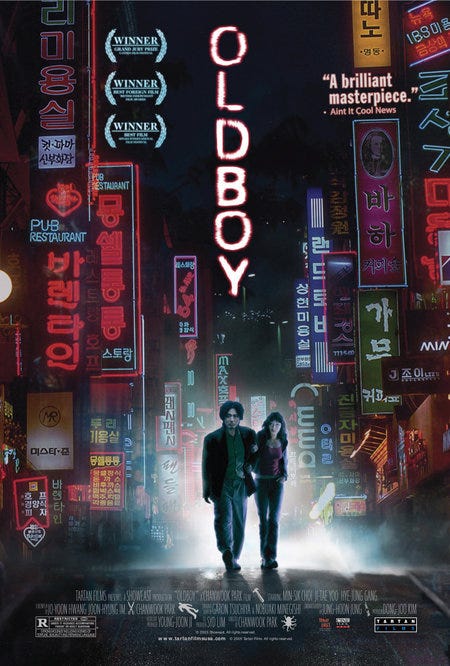I was having dinner with some friends recently and some foreigners who have been living in Japan for a year or so for work were joining us as well. We were discussing the Japanese work culture and jokingly saying that if they did speak fluent Japanese, they would need to work longer hours at the company. Essentially by playing the ‘gaijin card’ ー Japanese people will allow them to leave at 6:00pm because, well… they're not Japanese. I couldn’t help myself and said, “Damn that’s real though. If I was able to be that hafu who didn’t know how to play the Japanese role, I could have had a very different life.”
We had a moment of silence, and then kept on eating our delicious smoked ricotta pasta.
The thing is, I do think about a life that I might have had on the other side ー if I was not bilingual and bicultural. If I was either completely Japanese or American. Not equal parts both, but just one or the other. It’s not that which is better, but the possibilities are always alluring. It feels a bit long overdue to talk about identity struggles as a third culture kid but every hafu’s story is different and unique and mine was as well. I was thinking how relevant my story can be to non-hafu people but I think there is a common place we can all step aside and think for a moment ー to revisit our sense of belonging. I’m completely fluent in English, but I never felt like I’m American enough. My morals and ethics are based on the Japanese handbook. When I’m traveling in Asia, I’m a white passing person, and even in Japan, I don’t look Japanese enough. Some things I was able to control, like I was able to alter my looks to be more Japanese, but others, I found it impossible to please the sentiment of ‘what it means to be Japanese.’
For me, I felt tethered being a hafu in Japan my whole life. The rules were so clear on how to be Japanese, no matter how hard I tried, I just never felt enough. I always felt half… I blamed others and especially Japanese people for it, but I also came to a conclusion that my identity is not to a fault of others. I was pushing so hard for others to realize that I’m Japanese!!! But the thing is, I wasn’t asking the right questions to myself this whole time; why have I always been so desperate to be considered Japanese? Why did that matter so much to me? Will my problems be solved if I am considered Japanese? We probably know what the answers to these are by now.
I wrote a piece for the Business Insider on the parenting section, not to be mistaken that I have parented a child but the experience of growing up in Japan interculturally. I wanted to dedicate this essay to further examine the experience. It’s impossible to write an experience of belonging in 800 words for a $200 article. I wrote it because the editor was looking for a story I was able to give ー but there is so much more that could have been said here, I want to give a supportive voice to it. The inline comments are for Substack and the original piece is in italic.
Enjoy x
*
"So are you…?" is a common interruption when I'm speaking with someone in English in Japan. Rightfully so — I have an American accent, I'm fluent in English and Japanese, and I look racially ambiguous.
I am what is called "hafu" in Japan, a term used for children who are part Japanese or for people who are multiethnic more generally. Curiosity is important, but explaining your life story to emphasize that you are equal parts of both cultures can be exhausting.
You see, it requires a lot of effort to live in Japan when you look racially ambiguous. I took everything personal when someone would stop me mid sentence and ask me about my upbringing, I had to go through my routined answers I have prepared for myself that will make sense to others. Someone once said, “You feel like you are always in an interview you didn’t ask for.”
Japanese culture is clear on how I was supposed to act and behave but since I already looked different, even when you are doing or saying the right thing, it’s never enough for them. When I was younger, I felt confined being mixed race in a country that always questioned my abilities as a Japanese person, and that became fuel at some point to prove my Japanese side for the better or for worse. I was desperate to be considered Japanese. I was headstrong in weird places I guess. But later, it made sense why I was so eager to do so.
*
I was born and raised in Tokyo to an American mom and a Japanese dad. My mom is from Portland, Oregon, and my dad is from rural Nagano prefecture. They met in New York while they were in grad school — some teacher was playing Cupid, and they got together. My mom wanted to teach English abroad, and it so happened that she was dating a Japanese guy, so she moved to Japan. When I was growing up, the common language in the household was English. My dad was strict when it came to education. I went to a Japanese school my entire education up until university.
This was to illustrate…well that my parents got together because of some teacher. I guess nothing was weird back in those days.
Going to a Japanese school system my whole life, and being able to speak English the way I do is an achievement. That is credit I will give to both my parents and myself. But what I really wanted to add here was that I felt very responsible to be equal parts both. I knew from around 7 years old, I was different and I quickly resented the notion to inconvenience anyone. I never felt much like an inconvenience ー that’s because I spoke fluent Japanese and acted like one after trying to master the art of being Japaneseーbut I knew seeing my own mother, foreigners in Japan were treated as such, and knowing that I had foreign features, I already had a risk of becoming an inconvenience and I didn't want that. It was important for me to be the hafu who could swing both ways, because that also meant I was intelligent and unique. I wanted the world to know, (very Leo energy here) that my story was unique enough that I deserved to belong somewhere.
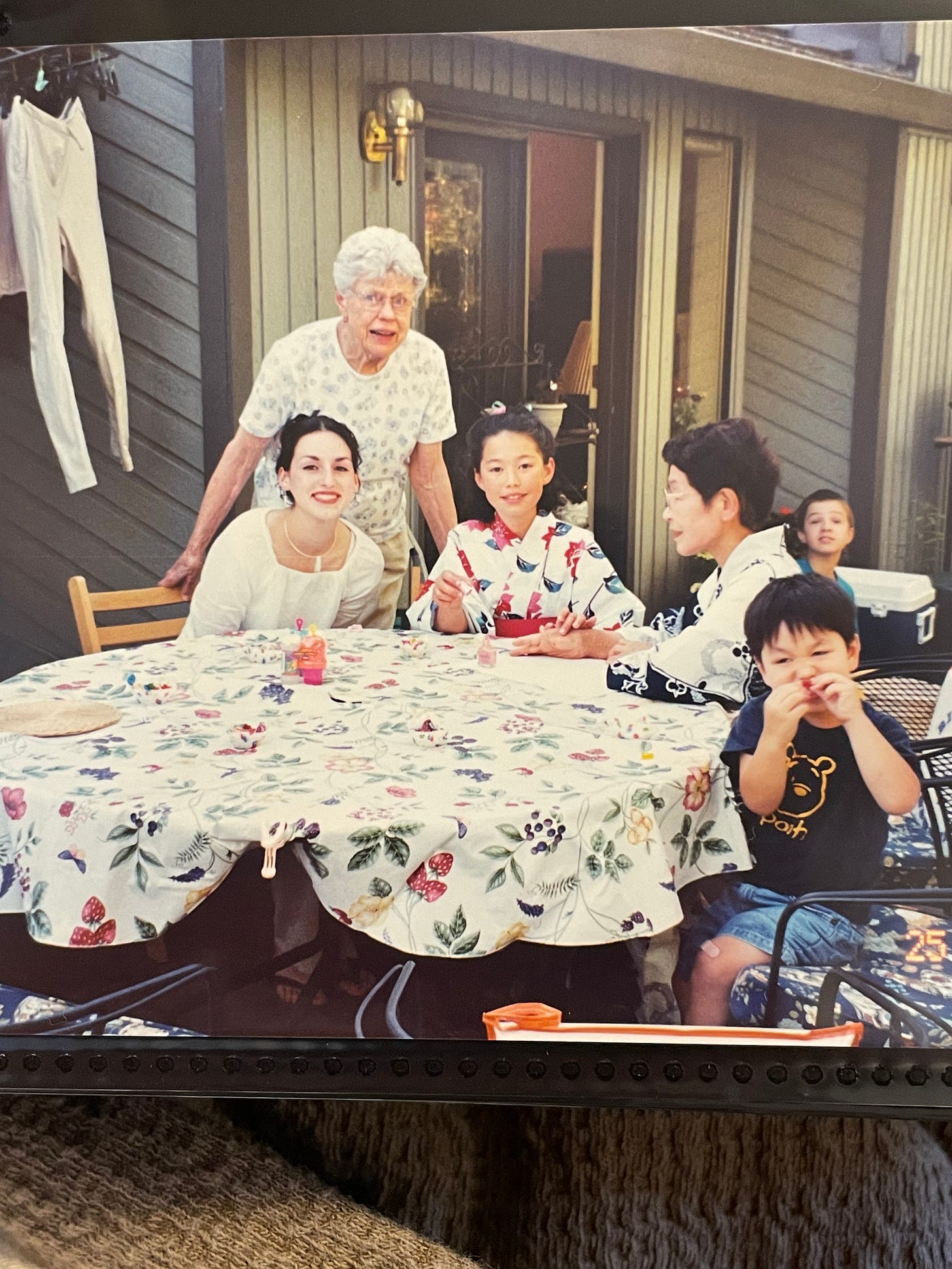
*
My parents were deliberate about the language we used in the house; I think they feared I might forget English. My teachers and friends all spoke Japanese, so I see how it could've happened. My parents talked to each other in English, so I was naturally exposed to it, and when I spoke in Japanese they would say "What is it in English?" My mom speaks relatively fluent Japanese now, but growing up I felt a need to take care of her in terms of translation. She couldn't read the school letters I received, so I had to tell her what they said; if I didn't, she wouldn't know when she needed to be at school for parents day or when she needed to pack lunch for a school trip. I think subconsciously I worried I'd fail my mom and myself if I weren't fluent in both — I felt responsible for both of us.
I think it was also crucial for me to be bilingual partially because of my mom too. I felt extremely responsible for her from a young age. We would go to a supermarket together and someone will talk to her in Japanese and when she didn’t understand, I would translate. I just didn’t want my mom to feel left out or even embarrassed. Maybe she never felt either of those, but as someone who was always desperate to mark herself at a certain place, I thought it was for the best.
*
Growing up as a hafu in Japan took a lot of effort. It added complexity on top of an already unequivocal culture code requiring you to behave and to value certain rituals.
I already felt out of place because of how different I looked from the other kids — wavy hair, lighter skin tone, and a slightly different body type — but I tried to compensate for those differences through my intellectual understanding of the culture. Sadly, it just was never enough.
I learned not to stick out and to familiarize myself with the cultural rules like staying quiet in public spaces or not eating while walking on the street. No matter how much I tried to learn the code of ethics, it seemed impossible for the rest of Japan to consider me as Japanese regardless.
I couldn’t dare to stand out looking ‘too foreign’ and I had a moment in my life where I spiraled. In my dating life, I self-pitied for no one liking me back for years, not because I didn’t think I wasn’t enough but because I thought I was too much.
I dressed more conservative, less skin showing even in the summer. I just thought Japanese men liked that sort of thing but my body type did not agree with them because I had foreign attributes. I was ‘too big’ to be perceived as ‘cute’ and ‘small’ just the way they liked it. I tried to wear Japanese brand makeup because I thought it would ‘tone down’ my looks. I straightened my hair for years because my natural curls were a distraction from Japanese men considering me as Japanese. My attempts were painstakingly tactful, I could write a whole book on it. I was desperate to find a communityーmy community that I could belong to and feel safe. It was probably around university where I finally was able to ask myself, “what am I doing all of this for?”
*
I was bullied when I was about 9 years old for being hafu. A couple of boys started to pick on me at an after-school program. One day, when I was having lunch that my mom prepared for me, I was eating the Nature Valley crunchy granola bar at my desk. The boy would point at me and say, "Ew, what is she eating." It was the same story you might hear from children of immigrant Asian parents in America, but flipped. Then, in my teens, I suddenly became a popular kid. Everyone wanted bigger eyes, lighter hair color, or even freckles as I did. I became a commodity, and it was cool to be me.
I was Japanese but foreign in equal measure, and it confused people including me, but it also fueled my desire to become fluent not just in language but also in culture, and for that I'm grateful.
The bullying only lasted a couple of weeks, but I’m sure other hafu’s had to endure it as well at some point in their lives. What’s funny is that being half white became a disadvantage while in the rest of the world, it works the other way around. The bullying hurt me of course, but it hurt me not because it was an attack on my identity but more so that I couldn’t believe that I could be an outcast like that. As silly this may sound, I am pretty easy going and non confrontational my whole life. In other words, people tend to like me pretty easily. It felt like such a personal attack when I was not likable, and that hurt me the most. I did learn my lesson to never eat a Nature Valley granola bar because that would make me ‘othered’, I knew better not to have done that in public and I tried my best to be nihonjin as much as possible for the sake of searching for my community.
As a student of love, I am prone to creating meaningful connections with people. At the time, I probably really meant it by wanting to be considered Japanese but when I ask myself, will becoming Japanese really solve all my problems? It actually wouldn’t have, because it was perhaps never about being Japanese but it was more so about longing for a connection I always craved for.
I have greater peace with myself now because I don’t prove myself to people anymore. I don’t dress, talk, behave in a certain way to be accepted. I present myself as how I was born ; once what was a burden is now comfort. I don’t feel like I need to be a diligent ethic code reader. I also don’t feel desperate for people to see me as Japanese. If I know what I am and others who love me know as well, probably that’s all that matters. There are actually so many ways to be Japanese, we are just a nation that finds it challenging to see beyond the surface sometimes and that’s not just unique to Japan. I know somewhere in Japan that there’s an old man who lives without electricity because he doesn’t think he needs it. I know there are young women who work in porn and gravure photography to empower femininity. They don’t have a conventional Japanese lifestyle, but again, we all perhaps know what it means to be Japanese. There are different ways to be Japanese while identifying as one. (I will shout out this article by the NYT; There’s Not Just One Way to Be Japanese ) It is true that certainty and uncertainty coexist, like I am unsure sometimes if I’m Japanese enough for people’s liking, but once I stopped fixating my identity and sense of place for the sake of others, I feel a huge relief ー I’m relieved that I have a choice that my identity doesn’t solely rely on other people’s decision anymore.
Other Stuff
Each week, I give you some extra things you can read/listen/watch that I consumed and thought was interesting. Here is this week’s edition! If you like this portion of the newsletter, I do a whole section dedicated for it once every month called #juststuff where you can read all the archive here. Enjoy.
Read
-Camille Charrière: We Need To Be Having More Honest Conversations About Fertility – And Not Just With Our Girlfriends If anyone has gone through this, I really can’t imagine the emotional rollercoaster, and I can’t appreciate the honestly in this enough.
-I Want to Die but I Want to Translate Korean Literature: Why Translation Matters Just as Much as Eating Tteokbokki on why translating Korean literature matters, not the ones by cis men. Honestly, I’m a fan of Anton Hur now, and everyone else should too.
-Book! Cursed Bunny was this months Koen book club book picked by me! It was equal parts, terrifying, creepy and honestly some parts just weird but surrealism books are very thought provoking, I loved our discussion! :)
-One of my favorite substack’s I follow regarding art ー specifically women art history is
She wrote in the guardian Ch-ch-ch-changes! The artists who prove it’s never too late to try something new.As we enter the new year, we should remember that it’s never too late to pick up something new, or return to something you once did – from delighting in a Christmas present, having an epiphany after seeing a flower, or taking encouragement from a good friend. Similarly, if someone you know needs a change, tell them it’s possible. Not that it’s without challenges, but as Johnson told me on her return to the studio: “It felt like coming home.”
-
Sorry I'm Late - I was in snowy Finland trying not to get a UTI an engaging read. Never had an UTI actually.-
recent installment was a review on Asako Yuzuki’s Butter. I purchased it immediately on Mercariーcan’t decide which cover is more buttery!!Listen
-You can listen to Bora Chung’s interview on how she made Cursed Bunny; This one and this one was pretty fascinating. The booker prize episode was good too!
-Brene Brown on Vulnerability! “The biggest shame trigger is not be perceived weak”
-Sophia Coppola on making things and directing things. I wonder if she really means it when she says, “I should stop making stuff about young women.”
-Desert island discs with Greta Gerwig was a fun listen!
-I once listened to this pod, and now I’m back at it. This episode on Britney’s book made me want to read it even more, which I’m sure is what a bookpod is suppose to do.
Watch
-Old boy (2004)
Take it or leave it, if you are in for some very unsettling Korean cinema, this is the OG one I guess. It’s a lot of people’s favorite movie and I see that, the plot twist and the revenge porn of it all is addictive. This past week has been filled with Korean literature and entertainment.
-Black Swan (2010)
Well, why did I watch Black Swan you might ask. It’s the recent
installment on GUMAMINA: Universal Flowering & Marissa Zappas. “What all this talk of Girlhood misses out on is how femininity is really a grotesque and painful business. It is bloody! And it starts young! Even the rigidity and inhuman perfection of ballet is made up of all kinds of ugliness to achieve the pinnacle of its beauty, and in itself a perfect example.”It’s so true. Perfecting beauty comes with pain. We have to endure so much, not just on the beauty aspect of it all, but to be the ‘good girl’ and the ‘bad girl’ as well. Being equal parts both, gives you the ultimate success. Can’t we just BE!!!
Thank you for reading this week’s love or not to love :) I appreciate you as always, and you can follow me on Instagram megsgumis for some more fun and yum content. As always Bisous x Megumi
